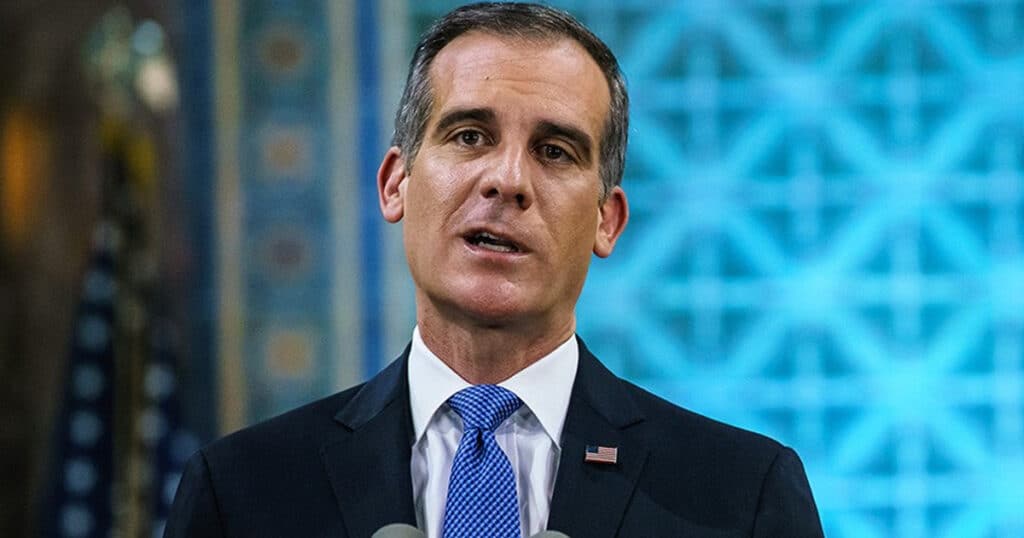
Seven GOP Senators Support Eric Garcetti as Ambassador to India Despite Ties to Sexual Abuse
If the confirmation of the United States’ new ambassador to India is any indication, the so-called #metoo movement — the social campaign first intended to offer support to victims of sexual abuse by publicizing their individual stories and later evolved into an ongoing effort to publicly shame and, in many cases, cancel those accused of sexual abuse, harassment and other improprieties — is all but dead.
By a vote of 52 to 42, the Senate approved as the top envoy to India former Los Angeles Mayor Eric Garcetti, who has been accused by members of his own city office staff, among others, of enabling sexually-abusive behavior of one of his former top aides, his former deputy chief of staff Rick Jacobs, who faces allegations of making inappropriate, sexually-charged comments in his workplace, initiating unwanted kissing and touching, making sexual advances toward a member of the mayor’s police detail, a married male reporter and a number of others.
Garcetti was suspected of not only knowing about but turning a blind eye to Jacobs’ behavior — and then turning around and telling senators during his first confirmation hearing that he didn’t know anything about the alleged harassment.
Senator Chuck Grassley, R-Iowa, opened an investigation that comprised interviews with 15 witnesses and examining 26 depositions and other documented evidence, including emails and text messages. Grassley’s investigative staff as a result concluded Garcetti “likely knew, or should have known, that his former senior advisor was sexually harassing and making racist remarks toward multiple individuals.”
Despite Garcetti and the Biden administration trying to explain away the complaints as a political hit job, the investigation determined Garcetti’s testimony last year before the Senate confirmation committee was almost certainly false, causing Grassley to speak on the Senate floor about his adamant opposition to Garcetti’s nomination.
“There is no place for sexual misconduct or racism. Mayor Garcetti had countless opportunities over the years to stand up for victims by removing his deputy chief of staff, which he failed to do,” Grassley said in December. “Nobody is that brazen to engage in this type of outrageous behavior against other people unless they know that they have a powerful enabler protecting them. Based on the facts and the evidence, that enabler is Mayor Eric Garcetti.”
Grassley concluded that “These fundamental failures by Garcetti are incompatible with the office that he seeks.”
Regardless, somewhere, somehow Grassley’s common-sense logic was lost over the holidays, because this week’s confirmation vote surely would have failed if not for the seven — seven! — Republicans who cast their ballots in favor of Garcetti.
The senators who ended up supporting Garcetti’s appointment are: Lindsey Graham of South Carolina, Todd Young of Indiana, Bill Hagerty of Tennessee, Bill Cassidy of Louisiana, Susan Collins of Maine, Roger Marshall of Kansas and Steve Daines of Montana. Senate Minority Leader Mitch McConnell seemed to make no effort to block the nomination.
The reason given for why the seven voted in favor of Garcetti was that the position had sat vacant for about two years, which is not any type of reasonable explanation in itself, except that reveals the hypocrisy of lawmakers like Graham, who was one of the sponsors of a law signed by President Biden in December called “The Ending Forced Arbitration of Sexual Assault and Sexual Harassment Act,” which prevents perpetrators from being able to compel survivors of sexual harassment and sexual assault into the “secretive, and often biased process of forced arbitration.”
Graham’s Democratic co-sponsor of the bill, which passed in the Senate last year by unanimous consent, was New York’s Kirsten Gillibrand, who also voted to confirm Garcetti.
Massachusetts Sen. Elizabeth Warren, who in the past claimed to be a victim of sexual harassment, also voted in favor of Garcetti.
Those who have fought to hold Garcetti accountable for his actions – or lack thereof – in connection to Jacobs’ behavior were greatly displeased by the Senate vote.
“It’s heartbreaking not just for me and the other whistleblowers and victims in this case, but also for those who are living through sexual harassment and abuse right now and look to our political leaders to protect them if they come forward with credible evidence,” said Naomi Seligman, Garcetti’s former communications director, a life-long Democrat and the one spearheading the effort to block Garcetti’s confirmation.
“To see this behavior rewarded at the highest level makes a mockery of purported bipartisan support of the #metoo movement. Senators cannot subject their values to political expediency,” Seligman said. “Remember, predators persist in their abuse only if enablers in positions of power allow them to.”
Liddy Liu of Whistleblower Aid, a DC-based group that helped fight the nomination, lamented that “Today’s confirmation flies in the face of what nineteen courageous whistleblowers, victims and witnesses came forward to bear witness to the Senate: that Eric Garcetti enabled, tolerated and covered up years of sexual abuse his top aide at Los Angeles City Hall…This will have a chilling effect on future attempts to hold enablers and perpetrators to account and cause victims and witnesses to think twice about the risks they are taking in coming forward. The Senate has voted against its own values, against the truth, and against the interests of our relationship with the world’s largest democracy. We must do better.”
Despite the details of Garcetti’s tolerance of Jacobs being public knowledge, Biden nominated Garcetti anyway for the India position, though he did pass him over for other administration spots.
In addition to Garcetti’s apparent ties to the Jacobs issue, he reportedly also received significant sums of money from groups with suspected ties to the Chinese intelligence services, a notable dynamic, and perhaps a conflict of interest for the incoming ambassador, since China and India have a chilly relationship at best.



